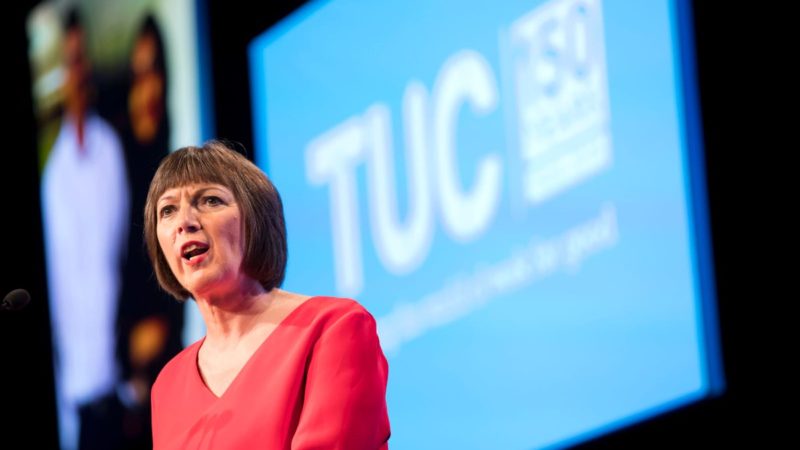
Frances O’Grady has criticised the government’s “heartless decision” to oversee further real-terms pay cuts for public sector employees after research revealed that nearly one in five key worker households have children living in poverty.
The analysis, published today by the TUC today, found that the number of children growing up in poverty in key worker households has increased by 65,000 over the past two years to 989,000. The federation of trade unions forecasts that the total will raise to 1.1 million in 2023 if the government does not take further action.
The general secretary said: “Our amazing key workers got us through the pandemic. The very least they deserve is to be able to provide for their families.
“But the government is locking too many key worker households into poverty. Ministers’ heartless decision to hold down pay will cause widespread hardship and put the UK at greater risk of recession.
“After the longest wage squeeze in 200 years, we urgently need to get more money in the pockets of working families. This will help people get through this cost-of-living crisis and inject much-needed demand into our economy.”
The research – commissioned by the TUC and carried out by Landman Economics – found that key worker families in the North East have the highest rate of child poverty at 41%, more than twice the national average of 19%.
The regions with the next highest rate were the North West and London on 29%, followed by the East of England on 24%. Scotland and Wales were found to have the lowest rates on 8.3% and 8.9% respectively.
The research used the government’s own definition of ‘key worker’, under which 10.6 million of those in employment (33% of the total workforce) are classed as working in key worker occupations and industries.
The TUC said the rate of child poverty in key worker households was “likely to get worse” as a result of ministers overseeing another year of real-terms pay cuts for public sector workers.
The union body said the cuts would have a “devastating impact on frontline workers”, highlighting its own analysis that calculated that paramedics’ real pay would be down £1,500 in 2022, while nurses would be £1,100 worse off.
O’Grady declared: “It is particularly galling that as key workers are being told to tighten their belts, city executives are enjoying bumper bonuses. Once again ordinary working people are being forced to carry the can for a crisis made in Downing Street.”
TUC analysis in June found that bonuses in the financial and insurance sector grew by 27.9% in the last year – six times faster than average wages, which grew by 4.2%.
The TUC is urging the government to guarantee decent living standards by raising the national minimum wage immediately, giving all key workers a “fair pay rise” that meets the cost of living and funding the public sector so that all outsourced workers are paid at least the real Living Wage and get parity with directly employed staff.
It is also calling on ministers to boost universal credit to 80% of the real Living Wage, significantly increase benefit payments to children and remove the two-child limit within social security.
The Bank of England announced on Thursday that it is raising interest rates by half a percentage point – the largest increase in the cost of borrowing for 27 years. The latest increase takes the UK’s rates to 1.75%.
The Bank also predicted that inflation will rise even higher in the coming months, to around 13%, largely as a result of increases in the price of gas. It projected that the UK will enter recession from the fourth quarter of the year and that real household post-tax income will “fall sharply in 2022 and 2023”.
Commenting on the announcement, TUC head of economics Kate Bell said: “Working people need an approach to inflation that protects jobs and that helps pay keep up with prices.
“But a rate rise does nothing about the current causes of inflation – global energy, commodity and food prices. It will only add to our problems, making a recession very likely and putting lots of people’s jobs at risk.
“Businesses had tremendous support from taxpayers during the pandemic. They should now help to counter inflation with greater profit restraint – especially energy firms.
“And the government must do more to get pay rising, starting with decent pay rises for public servants, a higher minimum wage, and stronger rights for working people and their unions to bargain for fair pay.”




More from LabourList
Ex-Cooper aide: ‘Keir’s ground-breaking deal with France suggests his migration approach could be bearing fruit’
Labour to scrap first past the post for mayoral and PCC elections
New intake Labour MPs: ‘Why we set up the Living Standards Coalition’